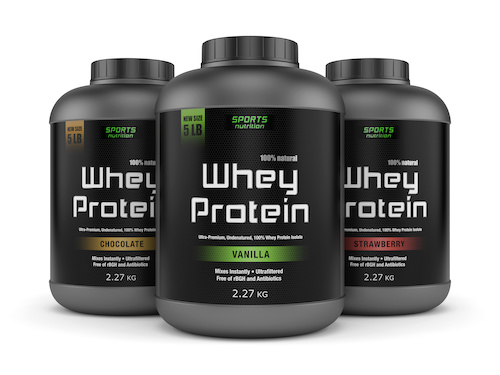Do you regularly use a protein shake or bar as a meal replacement or snack? Are you confused about the proper use and efficacy of these protein supplements?
According to a recent evaluation, protein powder sales make up 70 percent of the booming $16 billion sports nutrition industry. Sales of protein bars and other ready-to-eat nutrition products have reached approximately $2.5 billion! Interestingly, the purchase of these products isn’t limited to athletes… look around your grocery store and you’ll find the shelves are stocked to allow easy access for casual exercisers and your “average Joe” just looking for a quick on-the-go meal replacement. So what do protein powders and related nutrition bars really have to offer, and why are we all jumping on this bandwagon?
Understanding Protein
To understand the craze, it’s important to first look at protein from the simplest perspective. Nutrition 101 tells us that protein is a macronutrient – a type of food that should be consumed in large amounts in the human diet. There are three macronutrients: protein, carbohydrate and fat. While carbohydrate and fat are heavily used for supplying energy, dietary protein is quickly broken down into amino acids, often called the “building blocks of life,” which are utilized for a variety of functions including the buildup and/or repair of tissues like muscles. Everyone needs to consume adequate protein each day to ensure their bodies don’t attempt to source it internally (that is, pull it from lean body mass).
The good news: from the perspective of quantity, the “typical American diet,” which has hefty portion sizes, tends to provide more than enough protein for most individuals. The bad news: the quality of the protein-rich foods we as a society predominately choose is not ideal – fast-food cheeseburgers and fried chicken nuggets leave much to be desired.
The fact that a vast majority of the population is on a quest to improve their diet and physique, coupled with our knowledge of protein’s role in building lean body mass, is the perfect recipe for a boom in the industry of protein supplementation! Fortunately, protein has many benefits; consuming foods rich in this macronutrient allows for greater satiety and blood sugar control, and it ensures that we stock our bodies with vital nutrients like B vitamins and iron.
Unfortunately, the simple act of ingesting a protein shake or bar doesn’t provide instant muscle for us the way canned spinach did for Popeye. Building muscle requires a bit more strategy, including properly timing protein intake, selecting quality food sources and incorporating appropriate resistance training.

Who Should Consider Protein Supplements?
A protein supplement in the form of a powder, shake or meal bar may be warranted if you meet any of the following criteria*:
- You regularly have no time for a proper meal or snack
- You are increasing your workout frequency or intensity
- You are recovering from an injury
- You are starting a vegan diet
- You have a condition, such as bariatric surgery or cancer, that inhibits protein absorption and/or increases need
*All of the above circumstances warrant individualized care and planning, so consider reaching out to a Registered Dietitian to discuss your own personal needs in more detail before incorporating supplemental protein into your diet. You may find that your needs can be met through whole foods alone!
Does It Matter When You Consume Protein? Which Product Should You Choose?
While most Americans get plenty of protein from their diets alone, we do often fall short when it comes to appropriate timing, and our sources can be quite lousy; it’s important to remedy these issues if you are hoping to increase muscle mass and control your weight.
Research has demonstrated that a moderate intake of protein (30 grams) within a meal increased muscle synthesis by approximately 50 percent in both young and elderly individuals. This was tested against a much larger serving (90 grams of protein), which demonstrated no greater results. This study, like many others, indicates that our bodies can absorb and utilize only a certain amount of protein at a time! Anything beyond the 30-gram “sweet spot” is generally a waste of your digestive efforts (and potentially your money).
Rather than attempting to load your body full of protein all at once, direct your efforts to the strategic distribution of protein throughout the day; this allows your body to have a steady stream of those powerhouse amino acids available all day long! Aim for about 10 grams of protein with snacks and 20 to 30 grams with meals. A great time to work in a healthy dose of protein to feed your muscles (via meal or snack) is within the first hour following a strenuous workout. Even without exercise, the inclusion of small protein-rich snacks between meals is a great way to maintain satiety.
From a whole foods perspective, it’s important that you choose lean protein options over varieties that are high in saturated fat (for example, lean chicken breast is a better choice than beef). But if you are on the hunt for a protein powder, you’ll likely find the ever-expanding selection confusing. Options derived from milk protein (such as whey powder) still reign, but plant-based versions are gaining momentum. Walk around your favorite natural foods store and you’ll find that soy, rice, hemp and pea protein products are readily available.
The number one difference in animal-based versus plant-based protein powders is the amino acid content. Protein that comes from animal sources is considered to be “complete protein.” Complete proteins contain all essential amino acids necessary for proper bodily functions. Plant proteins are considered to be “incomplete protein.” You guessed it: this means plant proteins are lacking in one or more of the essential amino acids. For this reason, animal-sourced protein products are generally preferred over plant-sourced ones. Of course, dietary needs and preferences vary; the availability of plant-sourced protein products makes it easier for vegans, vegetarians or those with milk-protein sensitivities to find safe alternatives.
How Can You Apply This Information to Your Life?
If you are just an “average Joe” or “casual exerciser,” you likely will (and should) obtain adequate protein to meet your needs through whole foods if you eat regular meals and snacks and apply basic nutrition principles when building your plate. You can also save yourself A LOT of cash if you go this route! Protein powders, bars and ready-to-drink shakes are not cheap.
For those of you who are participating in more strenuous exercise on a regular basis and/or are coping with a health condition or dietary restriction that limits your intake of protein from whole foods, a supplement may be a necessary addition to your well-balanced plate to ensure you are taking in enough calories and protein to meet your needs.
If you are just looking to use a protein bar or shake because you never have time to eat, I challenge you to consider revisiting an old childhood favorite: the peanut butter and jelly sandwich! Pick up a nice whole-grain bread, natural peanut (or other nut) butter and a jar of fresh preserves, and you’ve got everything you need for a plant-based, protein-rich, fiber-full meal that can be ready in no time! In fact, in the time it took you to read this post, you could have already whipped one up for the day!
Remember, protein needs vary greatly among individuals! If you are concerned about your current protein intake due to a health condition or dietary restriction, are an exercise enthusiast looking to build muscle and/or just want to explore the topic of protein in more detail, be sure to set up an appointment with one of the providers at LifeStyle Medical Centers!
Sources:
http://www.health.harvard.edu/blog/how-much-protein-do-you-need-every-day-201506188096
http://www.todaysdietitian.com/newarchives/030413p26.shtml
http://greatist.com/fitness/protein-supplement-nutrition-guide
https://authoritynutrition.com/animal-vs-plant-protein/
http://ironman.memorialhermann.org/sports-science/when-to-eat-protein-and-carbs-to-build-muscle/

